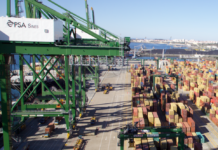
A new study by the American Bureau of Shipping (ABS) has shown that a new-build, dual-fuel gas carrier vessel generates lower CO2 emissions over the course of its operational life than an existing gas carrier converted to dual-fuel operations.
In particular, ABS compared potential greenhouse gas (GHG) emissions between a new-build, dual-fuel very large gas carrier (VLGC) and conversion of two VLGCs of Avance Gas Holding Ltd. (AGH) ships over 20 and 25-year life cycles, including decommissioning.
The findings of the study suggest that conversion increases emission intensity by between 13.7% and 32.6% over new construction.

Meanwhile, the Marine Bunker Exchange (MABUX) World Bunker Index continued its moderate growth on week 38. The 380 HSFO Index rose to US$471.48/MT, the VLSFO Index increased to US$568.85/MT, while the MGO Index grew to US$667.61/MT.

Furthermore, the MABUX LNG Bunker Index in the Amsterdam-Rotterdam-Antwerp (ARA) region, calculated as the average price of LNG as a marine fuel in the ARA area continued its moderate decline over week 38 to US$1051.49/MT.
At the same time, LNG Bunker Index decreased to US$1054.51/MT, while the average MGO LS price in Rotterdam increased by US$14.67/MT over the same period, and the average price difference between bunker LNG and MGO LS in Rotterdam decreased to US$452.51/MT.
“Prices for LNG as a bunker fuel in the ARA region continue to rise supported by possible Nord Stream 2 delay and limited pipeline gas supplies from Russia, as Gazprom has not booked additional supply capacity through Ukraine in October,” commented MABUX.
The prices could be seen even higher to compete with Asian gas prices in order to attract LNG cargoes to Europe, according to the MABUX report.

In the meantime, the average weekly Global Scrubber Spread (SS) – the price difference between 380 HSFO and VLSFO – rose slightly during week 38 to US$96.79.
Additionally, the average value of SS Spread in Rotterdam keeps a stable position over the US$100 mark, at US$112.83. The average weekly SS Spread in Singapore has also not changed significantly and stays at US$85.33.

Correlation of MABUX MBP Index (Market Bunker Prices) vs MABUX DBP Index (MABUX Digital Benchmark) in the four global largest hubs over the past week showed that 380 HSFO fuel grade was overvalued in all selected ports, except Houston, where it recorded an underpricing by US$7.
As for the other ports, the 380 HSFO remained overcharged by US$3 in Rotterdam, by US$40 in Singapore and by US$46 in Fujairah.
VLSFO fuel grade, according to the MABUX MBP / DBP Index, was also overpriced at all ports with minimum margins in Houston – plus US$1 and Rotterdam – plus US$7. Moreover, in Singapore and Fujairah, VLSFO overcharge levels reached plus US$10 and plus US$9, respectively.
MGO LS remains the only fuel that was underestimated by the MABUX MBP / DBP Index at all selected ports: the minimum margin in Houston – minus US$7, the maximum – in Singapore – minus US$36.




